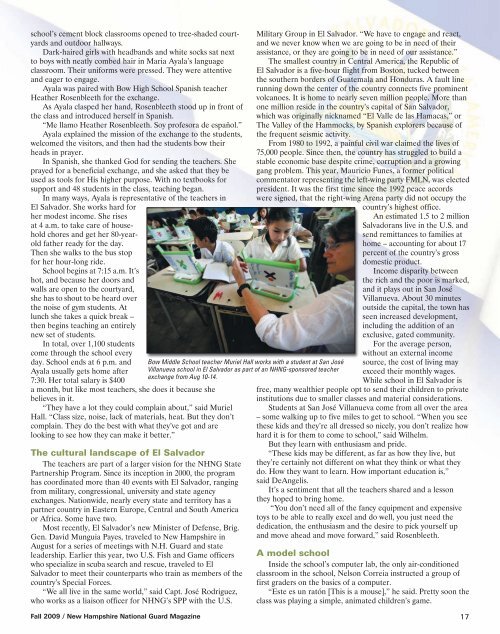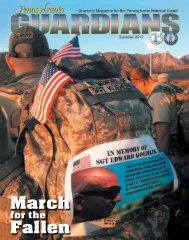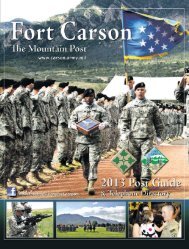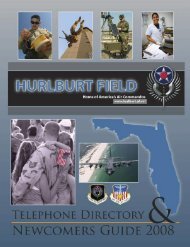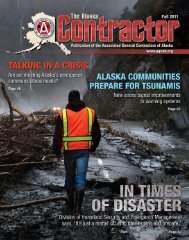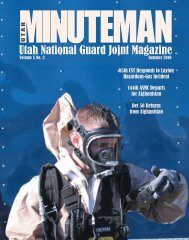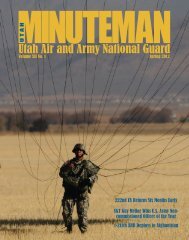New Hampshire National Guard - Fall 2009 - Keep Trees
New Hampshire National Guard - Fall 2009 - Keep Trees
New Hampshire National Guard - Fall 2009 - Keep Trees
You also want an ePaper? Increase the reach of your titles
YUMPU automatically turns print PDFs into web optimized ePapers that Google loves.
school’s cement block classrooms opened to tree-shaded courtyards<br />
and outdoor hallways.<br />
Dark-haired girls with headbands and white socks sat next<br />
to boys with neatly combed hair in Maria Ayala’s language<br />
classroom. Their uniforms were pressed. They were attentive<br />
and eager to engage.<br />
Ayala was paired with Bow High School Spanish teacher<br />
Heather Rosenbleeth for the exchange.<br />
As Ayala clasped her hand, Rosenbleeth stood up in front of<br />
the class and introduced herself in Spanish.<br />
“Me llamo Heather Rosenbleeth. Soy profesora de español.”<br />
Ayala explained the mission of the exchange to the students,<br />
welcomed the visitors, and then had the students bow their<br />
heads in prayer.<br />
In Spanish, she thanked God for sending the teachers. She<br />
prayed for a beneficial exchange, and she asked that they be<br />
used as tools for His higher purpose. With no textbooks for<br />
support and 48 students in the class, teaching began.<br />
In many ways, Ayala is representative of the teachers in<br />
El Salvador. She works hard for<br />
her modest income. She rises<br />
at 4 a.m. to take care of household<br />
chores and get her 80-yearold<br />
father ready for the day.<br />
Then she walks to the bus stop<br />
for her hour-long ride.<br />
School begins at 7:15 a.m. It’s<br />
hot, and because her doors and<br />
walls are open to the courtyard,<br />
she has to shout to be heard over<br />
the noise of gym students. At<br />
lunch she takes a quick break –<br />
then begins teaching an entirely<br />
new set of students.<br />
In total, over 1,100 students<br />
come through the school every<br />
day. School ends at 6 p.m. and<br />
Ayala usually gets home after<br />
7:30. Her total salary is $400<br />
a month, but like most teachers, she does it because she<br />
believes in it.<br />
“They have a lot they could complain about,” said Muriel<br />
Hall. “Class size, noise, lack of materials, heat. But they don’t<br />
complain. They do the best with what they’ve got and are<br />
looking to see how they can make it better.”<br />
The cultural landscape of El Salvador<br />
The teachers are part of a larger vision for the NHNG State<br />
Partnership Program. Since its inception in 2000, the program<br />
has coordinated more than 40 events with El Salvador, ranging<br />
from military, congressional, university and state agency<br />
exchanges. Nationwide, nearly every state and territory has a<br />
partner country in Eastern Europe, Central and South America<br />
or Africa. Some have two.<br />
Most recently, El Salvador’s new Minister of Defense, Brig.<br />
Gen. David Munguia Payes, traveled to <strong>New</strong> <strong>Hampshire</strong> in<br />
August for a series of meetings with N.H. <strong>Guard</strong> and state<br />
leadership. Earlier this year, two U.S. Fish and Game officers<br />
who specialize in scuba search and rescue, traveled to El<br />
Salvador to meet their counterparts who train as members of the<br />
country’s Special Forces.<br />
“We all live in the same world,” said Capt. José Rodriguez,<br />
who works as a liaison officer for NHNG’s SPP with the U.S.<br />
Bow Middle School teacher Muriel Hall works with a student at San José<br />
Villanueva school in El Salvador as part of an NHNG-sponsored teacher<br />
exchange from Aug 10-14.<br />
Military Group in El Salvador. “We have to engage and react,<br />
and we never know when we are going to be in need of their<br />
assistance, or they are going to be in need of our assistance.”<br />
The smallest country in Central America, the Republic of<br />
El Salvador is a five-hour flight from Boston, tucked between<br />
the southern borders of Guatemala and Honduras. A fault line<br />
running down the center of the country connects five prominent<br />
volcanoes. It is home to nearly seven million people. More than<br />
one million reside in the country’s capital of San Salvador,<br />
which was originally nicknamed “El Valle de las Hamacas,” or<br />
The Valley of the Hammocks, by Spanish explorers because of<br />
the frequent seismic activity.<br />
From 1980 to 1992, a painful civil war claimed the lives of<br />
75,000 people. Since then, the country has struggled to build a<br />
stable economic base despite crime, corruption and a growing<br />
gang problem. This year, Mauricio Funes, a former political<br />
commentator representing the left-wing party FMLN, was elected<br />
president. It was the first time since the 1992 peace accords<br />
were signed, that the right-wing Arena party did not occupy the<br />
country’s highest office.<br />
An estimated 1.5 to 2 million<br />
Salvadorans live in the U.S. and<br />
send remittances to families at<br />
home – accounting for about 17<br />
percent of the country’s gross<br />
domestic product.<br />
Income disparity between<br />
the rich and the poor is marked,<br />
and it plays out in San José<br />
Villanueva. About 30 minutes<br />
outside the capital, the town has<br />
seen increased development,<br />
including the addition of an<br />
exclusive, gated community.<br />
For the average person,<br />
without an external income<br />
source, the cost of living may<br />
exceed their monthly wages.<br />
While school in El Salvador is<br />
free, many wealthier people opt to send their children to private<br />
institutions due to smaller classes and material considerations.<br />
Students at San José Villanueva come from all over the area<br />
– some walking up to five miles to get to school. “When you see<br />
these kids and they’re all dressed so nicely, you don’t realize how<br />
hard it is for them to come to school,” said Wilhelm.<br />
But they learn with enthusiasm and pride.<br />
“These kids may be different, as far as how they live, but<br />
they’re certainly not different on what they think or what they<br />
do. How they want to learn. How important education is,”<br />
said DeAngelis.<br />
It’s a sentiment that all the teachers shared and a lesson<br />
they hoped to bring home.<br />
“You don’t need all of the fancy equipment and expensive<br />
toys to be able to really excel and do well, you just need the<br />
dedication, the enthusiasm and the desire to pick yourself up<br />
and move ahead and move forward,” said Rosenbleeth.<br />
A model school<br />
Inside the school’s computer lab, the only air-conditioned<br />
classroom in the school, Nelson Correia instructed a group of<br />
first graders on the basics of a computer.<br />
“Este es un ratón [This is a mouse],” he said. Pretty soon the<br />
class was playing a simple, animated children’s game.<br />
<strong>Fall</strong> <strong>2009</strong> / <strong>New</strong> <strong>Hampshire</strong> <strong>National</strong> <strong>Guard</strong> Magazine 17


